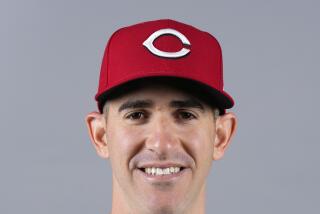‘Super Dove’ Nominated as Israel President : Politics: Weizman symbolizes to many Israelis their quest for peace with the nation’s Arab neighbors.
- Share via
JERUSALEM — Israel’s governing Labor Party on Thursday nominated as its candidate for president Ezer Weizman, a former air force commander and defense minister who became a “super dove” while helping to make peace with Egypt.
Weizman, 68, won 52% of the votes from 1,186 members of the Labor Party’s central committee, easily defeating another liberal, Arie (Lova) Eliav, and a center-right candidate, Shlomo Hillel.
Dismissed from the “national unity government” of then-Prime Minister Yitzhak Shamir three years ago for talking with leaders of the Palestine Liberation Organization, Weizman symbolizes to many Israelis their quest for peace with the country’s Arab neighbors, including the Palestinians.
“It surprised a lot of my friends that I went in that direction,” Weizman said Thursday of his transition from the organizer of the 1977 victory of the hard-line Likud Party into a man whom the late Egyptian President Anwar Sadat liked to call “my truest friend, Ezer.”
“I guess that it surprised me, too,” Weizman said.
He still must be formally elected president by the Knesset, Israel’s 120-member Parliament, and the Labor Party will have to campaign hard among smaller parties to ensure a majority for him against a candidate that the opposition Likud Party will nominate. Current President Chaim Herzog will end his second five-year term in May.
But Weizman, who broke with Israeli political tradition to campaign for the job, appeared confident of victory and promised to “bring leadership” to the presidency, a largely ceremonial post that could become much more important under an activist politician.
“There is a good chance that we are again on the brink of developments,” Weizman said. “I am not going to say when, but we are going in a direction that is not bad at all. If in the peace process, it will be with Syria, then it will be with the Palestinians. And if it is with Syria, then it is also with Lebanon. As I said, we are reaching the brink of developments.”
Prime Minister Yitzhak Rabin has been noticeably cool to Weizman’s candidacy for president, apparently from concern that Weizman’s maverick character, penchant for personal diplomacy and readiness to come to terms with the Palestinians could become a problem in peace negotiations.
But Weizman denied there are serious differences between him and Rabin. “We don’t see eye to eye on a few things, but not many,” Weizman said. “In the past, we saw eye to eye on many more things. There is absolutely no tension between us, absolutely none.”
The nephew of Chaim Weizmann, Israel’s first president, Weizman was born in Tel Aviv in a Zionist family, grew up in Haifa, and, at 18, joined the British air force to fight in World War II. After studying aeronautics in Britain, he helped establish the Israeli air force, rising to become Rabin’s deputy as chief of staff in the 1967 Six-Day War.
Weizman’s political evolution is less straightforward. He quit the military to lend his support to a national unity government led by Golda Meir. He then organized the 1977 Likud victory under Menachem Begin and became defense minister. But he quit in 1980 over what he saw as Begin’s reluctance to honor a commitment to grant self-rule to the Palestinians.
Opening his own contacts with the PLO in violation of government policy and Israeli law, Weizman--by now a member of the Labor Party’s left wing--was forced out of a later Cabinet in December, 1989. A year ago, he quit the Knesset and announced he was leaving political life--unless, he hinted, he was elected president.
More to Read
Sign up for Essential California
The most important California stories and recommendations in your inbox every morning.
You may occasionally receive promotional content from the Los Angeles Times.












